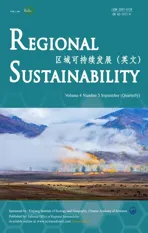Erratum regarding previously published articles
2023-06-06
Owing to a Publisher error, Ethics Statements were not included in the published versions of the following articles that appeared in previous issues of Regional Sustainability.
The appropriate Ethics Statements provided by the Authors, are included below.
1.“Co-management of small-scale fishery in the Tonle Sap Lake, Cambodia” (Regional Sustainability, 2021; 2/1:1-11) https://doi.org/10.1016/j.regsus.2020.12.002
Ethics Statement: Ethics approval was obtained from the Ethics Committee of Royal University of Phnom Penh.In addition, the participants provided their informed consent to participate in this study.
2.“Incremental adaptation strategies for agricultural water management under water scarcity condition in Northeast Iran” (Regional Sustainability, 2021; 2/3: 224-238) https://doi.org/10.1016/j.regsus.2021.11.003
Ethics Statement: Ethics approval was obtained from the Ethics Committee of University of Tehran.In addition,the participants provided their informed consent to participate in this study.
3.“Use of the knowledge, attitude, and practice (KAP) model to examine sustainable agriculture in Thailand”(Regional Sustainability, 2022; 3/1: 41-52) https://doi.org/10.1016/j.regsus.2022.03.005
Ethics Statement: The interview and questionnaire survey protocol was approved by the Research Ethics Review Committee (RERC) at the Asian Institute of Technology (AIT), Thailand.Written consent was obtained from all participants who took part in the study.
4.“Regional landscape transformation and sustainability of the rural homegarden agroforestry system in the Chengdu Plain, China” (Regional Sustainability, 2022; 3/1: 68-81) https://doi.org/10.1016/j.regsus.2022.04.001
Ethics Statement: Ethics approval was obtained from the Ethics Committee of Sichuan Agricultural University.In addition, informed consent was obtained from all subjects involved in the study.
5.“Any alternatives to rice? Ethnobotanical insights into the dietary use of edible plants by the Higaonon tribe in Bukidnon Province, the Philippines” (Regional Sustainability, 2022; 3/2: 95-109)https://doi.org/10.1016/j.regsus.2022.04.002
Ethics Statement: Ethics approval was obtained from the Ethics Review Committee of Bangor University, U.K.In addition, interviews were voluntary in nature, and the background and objectives of the study were explained in both Bisaya and Higaonon dialects.The participants and community leaders provided their informed consent to participate in this study.
6.“Impact of climate change on agricultural production: A case of Rasuwa District, Nepal” (Regional Sustainability, 2022; 3/2: 122-132) https://doi.org/10.1016/j.regsus.2022.07.002
Ethics Statement: Ethics approval was obtained from the Ethical Committee of Tribhuvan University.In addition,the participants provided their informed consent to participate in this study.
7.“Transaction costs for collaboration in the watershed management of the Cuyahoga River Area of Concern”(Regional Sustainability, 2022; 3/2: 146-156) https://doi.org/10.1016/j.regsus.2022.07.005
Ethics Statement: Ethics approval was obtained from the Ohio State University Office of Responsible Research Practices Institutional Review Board (Study ID: 2019E1048).In addition, the participants provided their informed consent to participate in this study.
8.“Evaluation of ecosystem supply services and calculation of economic value in Kargil District, India” (Regional Sustainability, 2022; 3/2: 157-169) https://doi.org/10.1016/j.regsus.2022.07.004
Ethics Statement: This article contains questionnaire-based survey research through verbal communication between authors and informants.The consent of each informant was taken before conducting the interview.Therefore does not exploit any human or animal subjects.We have also obtained Ethics approval from the Ethical Committee of Panjab University, Chandigarh, India.
9.“Livelihood vulnerability of smallholder farmers to climate change: A comparative analysis based on irrigation access in South Sulawesi, Indonesia” (Regional Sustainability, 2022; 3/3: 244-253)https://doi.org/10.1016/j.regsus.2022.10.002
Ethics Statement: The Graduate School′s Ethics Committee of Hasanuddin University gave its approval to this study (Approval No.2070/UN4.20.1/PT.01.04/2021, 28th April 2021).Also, prior to conducting participant interviews, the researcher obtained approval from the appropriate organization at the research site (Approval No.0322/DPMTSP/VI/2021, 15 June 2021).
10.“Traditional agroecological knowledge and practices: The drivers and opportunities for adaptation actions in the northern region of Ghana” (Regional Sustainability, 2022; 3/4: 294-308)https://doi.org/10.1016/j.regsus.2022.11.002
Ethics Statement: Ethics approval was obtained from the Ethics Committee of the Kwame Nkrumah University of Science and Technology.In addition, the participants provided their informed consent to either provide data or participant in this study.
11.“Assessment of the impact of climate change on the occurrences of malaria, pneumonia, meningitis, and cholera in Lokoja City, Nigeria” (Regional Sustainability, 2022; 3/4: 309-318) https://doi.org/10.1016/j.regsus.2022.11.002
Ethics Statement: Ethics approval was obtained from the Ethics Committee of the Department of Geography,Modibbo Adama University of Technology, Yola.In addition, all the participants provided informed consent to participate in this study.
12.“Land tenure security, place satisfaction and loyalty in the peri-urban area of Ibadan City, Nigeria” (Regional Sustainability, 2022; 3/4: 346-355) https://doi.org/10.1016/j.regsus.2022.11.004
Ethics Statement: Ethical approval was obtained from the Ethics Committee of Pan African University, Cameroon.In addition, the participants provided their informed consent to participate in this study.
13.“Production of Railwayscape in urban environment: Analysing railway heritage tourism potential in Siliguri City, India” (Regional Sustainability, 2023; 4/1: 1-12) https://doi.org/10.1016/j.regsus.2023.02.001
Ethics Statement: This research has been approved by the Research Progress Committee, formed in Banaras Hindu University to look after the author′s Ph.D.research, associated publications and concerned ethical subjects.In addition, the participants provided their informed consent to participate in this study.
14.“Students’ sustainability consciousness with the three dimensions of sustainability: Does the locus of control play a role?” (Regional Sustainability, 2023; 4/1: 13-27) https://doi.org/10.1016/j.regsus.2023.02.002
Ethics Statement: Ethics approval was obtained from the institute′s Ethics Committee (Bhopal School of Social Sciences).In addition, the participants provided their informed consent to participate in this study.
15.“A new approach towards the sustainability of urban-rural integration: The development strategy for central villages in the Abbasiya District of Iraq using GIS techniques” (Regional Sustainability, 2023; 4/1: 28-43)https://doi.org/10.1016/j.regsus.2023.02.004
Ethics Statement: Ethics approval was obtained from the The Higher Committee for Scientific Investigation and Plagiarism of Kufa University.In addition, the participants provided their informed consent to participate in this study.
16.“Spatial restructuring and the logic of industrial land redevelopment in urban China: IV.A case study of jointly redevelopment by multi-actors” (Regional Sustainability, 2023; 4/1: 44-53)https://doi.org/10.1016/j.regsus.2023.02.003
Ethics Statement: Ethics approval was obtained from the Department of Science and Technology of Nanjing Institute of Geography and Limnology, Chinese Academy of Sciences.The consent of each participant was taken before conducting the interview.
